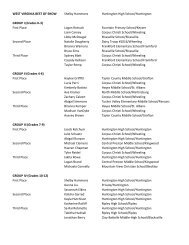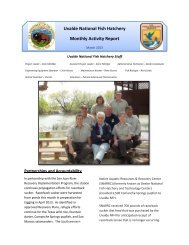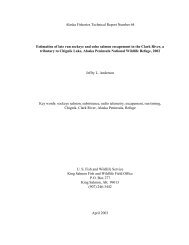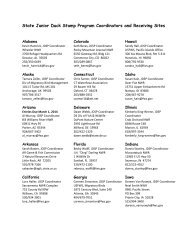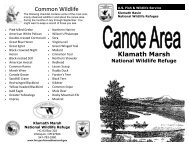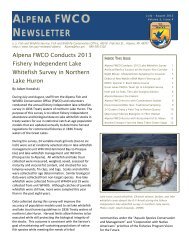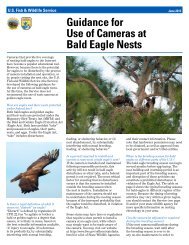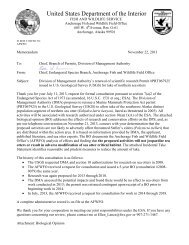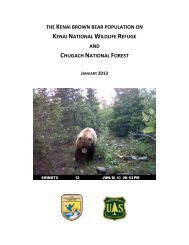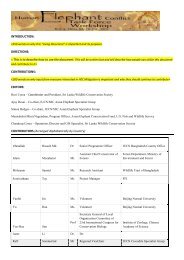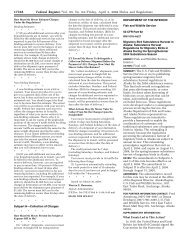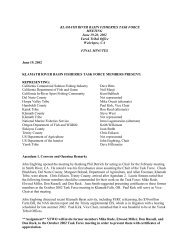Assabet River NWR Final CCP - U.S. Fish and Wildlife Service
Assabet River NWR Final CCP - U.S. Fish and Wildlife Service
Assabet River NWR Final CCP - U.S. Fish and Wildlife Service
Create successful ePaper yourself
Turn your PDF publications into a flip-book with our unique Google optimized e-Paper software.
Eastern Massachusetts National <strong>Wildlife</strong> Refuge Complex Draft <strong>CCP</strong>/EA November 26, 2003<br />
Recreation<br />
Due to the refuge’s proximity to heavily populated areas, <strong>and</strong> an already existing recreational<br />
trail system, accessing the refuge for recreation is a major concern of many respondents.<br />
Some respondents even see the refuge as a sort of town park. Many local residents that<br />
responded did not expect restrictions on recreation when they supported FWS’s offer to buy<br />
the property. Others support the concept that wildlife sanctuary should be the priority, <strong>and</strong><br />
use limitations should be imposed.<br />
Some respondents see access for recreation at the refuge as a means to an end: “Through<br />
controlled access to refuges you can create <strong>and</strong> sustain a community of citizens who will not<br />
only care for the refuges but also support the <strong>Fish</strong> <strong>and</strong> <strong>Wildlife</strong> <strong>Service</strong> in its struggle to<br />
maintain them.”<br />
Some respondents want the refuge to be used for quiet sports only, <strong>and</strong> ask that motors be<br />
prohibited to reduce noise, air <strong>and</strong> water pollution, erosion of soil, <strong>and</strong> to increase safety. As<br />
one respondent states, “I urge you to support making the refuge into a place where passive<br />
recreation can take place. By that I mean prohibiting motorized vehicles <strong>and</strong> hunting. The<br />
l<strong>and</strong> is a treasure for hikers, bikers, runners, birdwatchers, nature lovers <strong>and</strong>, as such, should<br />
be preserved for this <strong>and</strong> future generations.”<br />
Snowmobiling<br />
Snowmobilers describe themselves as law-abiding recreationists that are respectful of others<br />
<strong>and</strong> wildlife. One local snowmobile club would like to establish a trail through the refuge,<br />
maintained by the club, for the club’s enjoyment. This club goes on to point out that<br />
snowmobiling will not harm the terrain or wildlife because snowmobiling usually occurs<br />
from the beginning of January to the beginning of April (at the latest) <strong>and</strong> only when there is<br />
a minimum of four inches of snow. Further, snowmobiling is already governed by<br />
Massachusetts laws requiring, among other things, that snowmobiles stay on the trail.<br />
Snowmobiling, the club concludes, is a traditional use in the area <strong>and</strong> ask the FWS to let<br />
snowmobilers use traditional trails.<br />
Jogging<br />
Joggers view the refuge as a safe, peaceful place to pursue their activity, <strong>and</strong> are confused as<br />
to why jogging would be banned. One respondent states that the refuge “. . . is a beautiful<br />
place to jog, particularly because it is one of the few off-road places with no early morning<br />
traffic. It would be shame if joggers were not allowed to use the paths of the <strong>Wildlife</strong><br />
refuge.” Another respondent asserts that, “The joggers I’ve seen are respectful of walkers,<br />
seems inconsistent when hiking, snowshoeing, <strong>and</strong> cross-country skiing are allowed.”<br />
Another respondent writes: “If anyone ever asks, I guess I’ll just tell folks, ‘Oh no, I’m not<br />
running, I’m just hiking real fast.’”<br />
Summary of Comments 23




